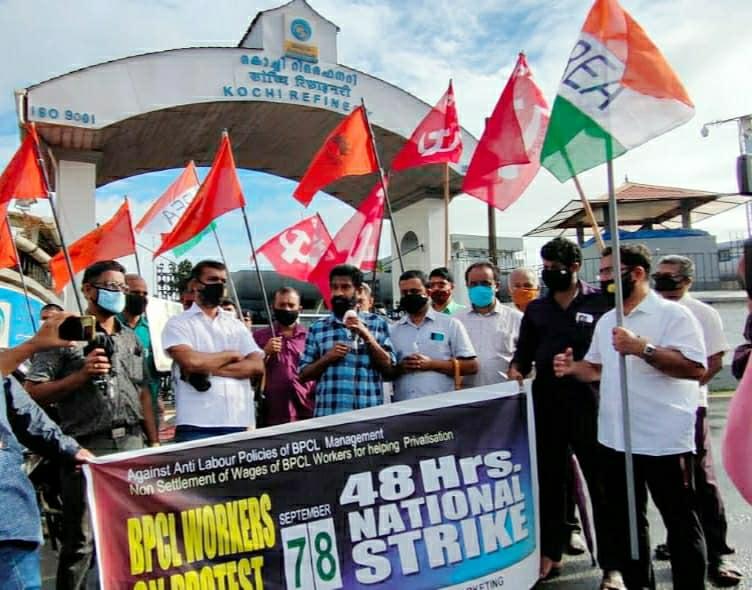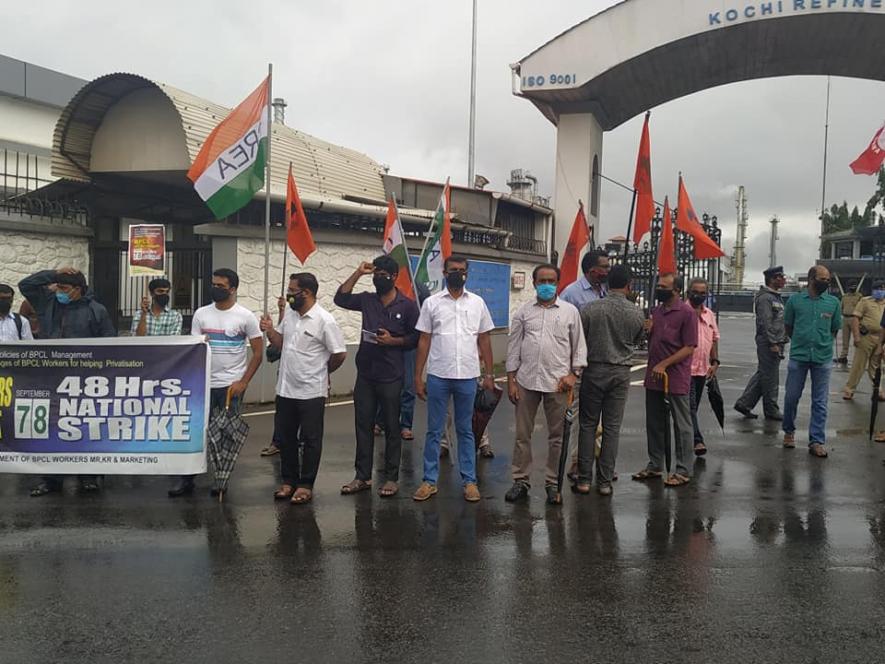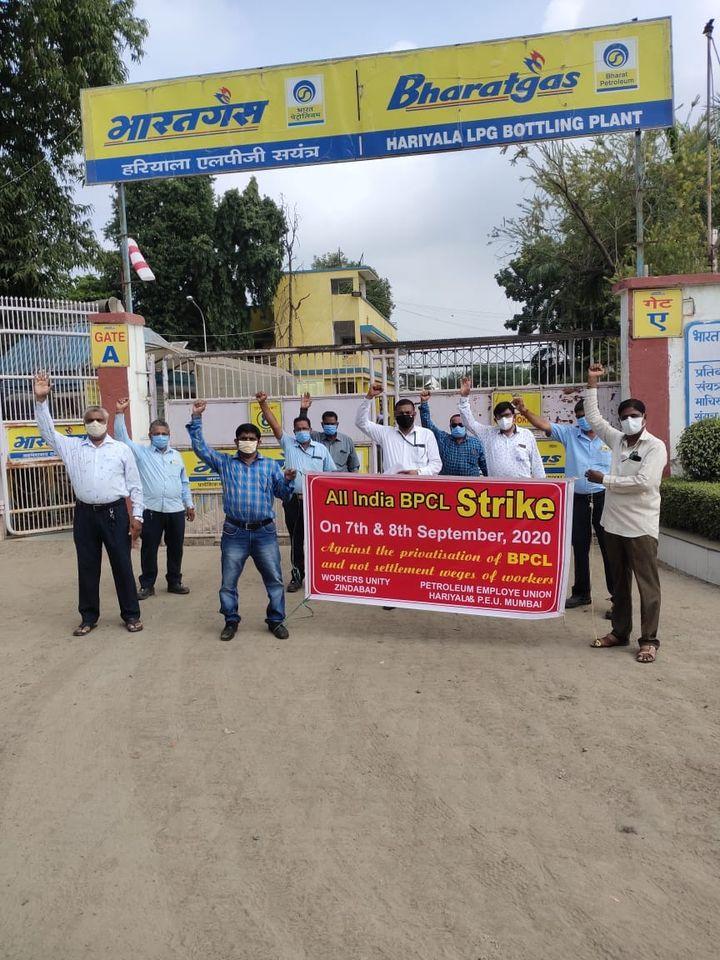Over 4,800 BPCL Employees on 48-hour Strike Against Govt’s Privatisation Drive

Kozhikode: Over 4,800 employees of Bharat Petroleum Corporation Limited (BPCL) have been on a 48-hour strike since Monday against the management’s decision to sign a long-term wage settlement that facilitates speedy privatisation of the company. As many as15 unions in BPCL’s Kochi and Mumbai refineries and marketing employees from various parts of the country have joined the strike that began on Monday morning.
“The first day of 48 hours strike was complete in Kochi and Mumbai refineries. In the eastern parts, too, all the LPG plants and marking depots have been closed,” Nogen Chutia, General Secretary of Petroleum and Gas Workers’ Federation of India told NewsClick.
Of the18 unions in BPCL, 15 are part of the ongoing strike. One union from Mumbai, which is affiliated to the Shiv Sena, one independent union from Chennai and one from Delhi have pulled out of the strike. In Mumbai, only some of the executives and trainees are still inside the refinery. But all permanent employees are striking. At the Kochi refinery, a unit of the Rashtrya Swayamsevak Sangh-affiliated Bharatiya Mazdoor Sangh (BMS) is also part of the strike, said Chutia.
“About 4,800 permanent employees out of total 5,400 went on strike on the first day,” he said.
WHY EMPLOYEES ARE STRIKING
The wage revision in BPCL, India's second-largest fuel retailer and third-biggest oil refiner, has been pending since January 1, 2017. The unions, however, have been demanding a wage settlement as per the guidelines of Department of Public Enterprises, which has been carried out in IOCL, CPCL and ONGC.

“The management offered a very marginal revision, which is below IOC, ONGC, HPCL. For a long time, the employees of BPCL have been demanding that they should be given benefits at par with other public sector oil companies,” Chutia added.
While the salaries of the BPCL management staff were revised as per the guidelines of the Department of Public Enterprises, which is common in the oil industry, the unions are demanding the same be applied to them as well. However, the management has apparently refused to accept this demand, MG Aji, General Secretary of Cochin Refinery Workers Association (affiliated to Centre of Indian Trade Unions or CITU), pointed out.
The conditions put forward by the management include acceptance of clauses of sale/purchase agreement for privatisation with the tendering party and curtailment of retirement benefits such as provident fund, gratuity, pension, and medical benefits upon privatisation, said Aji, adding that the management has refused to either convene a meeting for negotiations or to discuss various demands.
At Kochi Refinery alone, over 1,000 of employees belonging to the Kochi Refineries Workers Association (CITU), Cochin Refineries Employees Association (Indian National Trade Union Congress), the Refinery Employees Union and the BPCL Mazdoor Sangh (BMS) are participating in the strike.
Govt to Provide Rules on Employee Protection, Asset Stripping Later
The unions are miffed with the government’s decision to provide guidance on employee protection, asset stripping and business continuity in BPCL to potential acquirers of the company only at a later stage of bidding, which is mentioned in the privatisation rules issued by the Department of Disinvestment. The government is selling its entire 52.98% stake in BPCL.
Meanwhile, the preliminary expressions of interest or EoIs are due on September 30, which will be followed by qualified bidders being asked to submit financial or price bids.

The Department of Investment and Public Asset Management (DIPAM), erstwhile Department of Disinvestment, has issued clarifications on queries raised by potential bidders for government stake in BPCL.
On a query on restrictions relating to employee protection, asset stripping, business continuity and lock-in of shares, DIPAM said, "This information shall be provided to the Qualified Interested Parties (QIPs) in the RFP/ SPA (Request for Proposal/ Share Purchase Agreement)."
BPCL will give the acquirer ready access to 15.33% of India's oil refining limit and 22% market share of the world's fastest-growing fuel market.While the acquirer of the government’s stake will have to make the mandatory open offer to buy 26% stake from minority shareholders of BPCL on the same terms, the government advised the bidders to consult their legal counsels on the issue of such offers becoming mandatory for listed entities where BPCL may hold a stake.
The department clarified this in response to the question that "whether a mandatory tender offer will be triggered by the transaction in relation to Indraprastha Gas Ltd and Petronet LNG Ltd".
BPCL is a promoter of India's largest gas importing company, Petronet with a 12.5% stake. It is also co-founder and promoter of Indraprastha Gas Limited or IGL, which retails CNG in the national capital region. BPCL holds 22.5% stake in IGL.
The government stake sale in BPCL would happen after the company's Numaligarh refinery in Assam is hived off from the company and sold to a public sector unit. Numarligarh Refinery Limited (NRL) was originally under BPCL. The government had decided that it should not be included in BPCL selling and then it was exempted from the sale. BPCL had 63% equity in NRL.
Now, “NRL will be handed over to one public sector oil company- probably to Oil India Limited. Engineers India Limited will also participate. Earlier the share of state government in NRL was 10%. Probably this would become 20%. These are yet to be finalised,” said Chutia.
The government, however, ruled out changing the requirement of bidder or consortium of bidders together having a net worth of $10 billion. "Request for reduction of net worth criteria cannot be accepted," it said.
It also did not accept a proposal to shift the venue of the arbitration, arising in case of dispute in the privatisation process, to a neutral forum such as Singapore.
"Not acceptable," DIPAM said adding that the venue of arbitration is in New Delhi.
"If a qualified IP (interested party) has submitted its EoI independently of any other and subsequently wishes to form a consortium for the bid, then the same is permitted, provided the consortium is formed within 45 days of it being qualified as a QIP," DIPAM said.
However, this will only be permitted so long as such QIP is the lead member of the consortium. Additionally, each of the consortium members should be qualified for the bidding.
"Where two sole bidders have qualified based on the EoIs submitted by each of them independently, the formation of a consortium by these sole bidders will not be permitted. Similarly, in case two consortia have been qualified based on the EoIs submitted by them independently, then their consolidation into a single consortium shall not be permitted," DIPAM added.
(With Inputs from PTI)
Get the latest reports & analysis with people's perspective on Protests, movements & deep analytical videos, discussions of the current affairs in your Telegram app. Subscribe to NewsClick's Telegram channel & get Real-Time updates on stories, as they get published on our website.
























